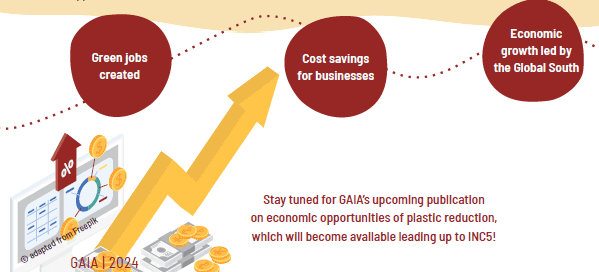
In the wake of the Nigerian plastic tsunami, a coalition of CSOs, including the Centre for Earth Works (CFEW) in Nigeria, have continued to amplify their voices to address this growing menace of plastic pollution, undermining sustainable growth, development, and ecological conservation. The plastic treaty has proven to be a strong framework for combating plastic pollution, CFEW in collaboration with members of the GAIA Nigeria team, including the Green Knowledge Foundation (GKF), Community Development and Advocacy Foundation (CODAF), and Environmental Right Action (ERA) through the Plastic Treaty policy project has been at the frontline of intense engagement with the Nigerian government at Federal, State and Local level to promote the ambitious positions of the BFFP movement and GAIA Network including the efforts to ban all single-use plastics and establish mechanisms for plastic withdrawal by industries, business centres and in households.
Nigeria is a major producer of plastics in Africa. Nigeria’s plastic industry is driven by the country’s petrochemical industry and large growing population. The country has a population of over 200 million people, and this number is expected to continue to grow in the coming years. The growing population is creating a huge demand for plastic products, such as packaging, bottles, and construction materials. Plastic production is set to increase along with the importation of virgin plastic pallets.
The past six decades witnessed the introduction of different nascent plastic materials, which were highly appreciated globally due to their water-resistance nature, durability, and affordability. These qualities of plastics support the convenient packaging of most household items and other industrial products that support human consumption, thus, promoting the production of large quantities of plastics, including single-use plastics. However, since plastics are made of non-biodegradable substances, they pose serious threats to the world’s ecosystem with grave health effects on both human and marine lives. A local study of children and adolescents living and going to school near major dumpsites across African urban centres reported respiratory, gastrointestinal, and dermatological illnesses. However, to date, there is no international data on the health impacts of burning plastic waste.
Following several activities from CSOs, especially the GAIA Nigeria Team with CFEW spearheading the Plastic Treaty policy advocacy in the country. We have had press media briefings, social media engagement, and publications, including the Nigeria Plastic Tsunami launched in September 2023. Subsequent Pre and Post INC engagements with Federal and State government bodies, including The Federal and state Ministry of Environment, The Nigeria Customs Service, The National Environmental Standards and Regulations Enforcement Agency (NESREA), Lagos State Waste Management Authority (LAWMA), and community leaders across the country at regular intervals to debrief the ongoing plastic treaty process and how the country can be better positioned for the implementation of the result. This advocacy has been carried on to the following states, such as Plateau, Delta, and Edo, where the Nigerian Plastic Treaty Project is being implemented.
The Plastic Policy advocacy has yielded some positive outcomes in recent times, starting with a fresh commitment from the Ministries of Environment to ensure inputs from the GAIA Movement position as they look to revise the Environmental management policies, especially the one on Plastic pollution, followed by the ban on single-use plastics within their premises, which serves as a pace-setting.
The government of Lagos state, which is the most populous and industrious state in the country, has recently announced a ban on the usage and distribution of styrofoam and other single-use plastics in the State, with Abia State following, and more states are expected to make their announcement in the coming days. Other major outcomes include individuals in various communities’ commitment to embrace a Plastic-free lifestyle.
Ends.




























